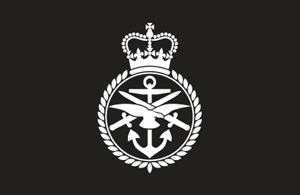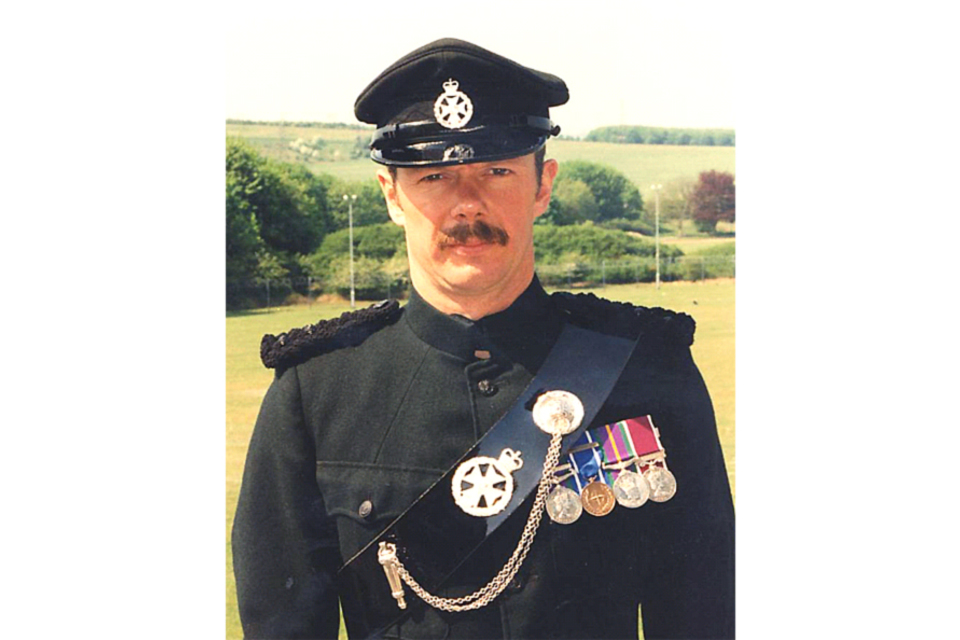Major Paul Harding 4th Battalion The Rifles killed in Iraq
It is with great sadness that the Ministry of Defence must confirm the death of Major Paul Harding from 4th Battalion The Rifles in Basra City on Wednesday 20 June 2007.

Major Harding died as a result of an indirect fire attack on the Provincial Joint Coordination Centre in Basra in the early hours of the morning, local time. Aged 48, Major Harding lived in Winchester with his wife and two sons.

Major Paul Harding (All rights reserved.)
Lieutenant Colonel Patrick Sanders OBE, Commanding Officer, 4th Battalion The RIFLES, said of Major Harding:
A eulogy is intended to celebrate the life of the person whose name it bears and to pay him respect and honour in death. But as I sit here in Basra Palace trying to do justice to Major Paul Harding, there are simply no words that can do the job adequately.
Paul was killed by an enemy mortar round at about 0100 this morning at the Provincial Joint Coordination Centre (PJCC) in central Basra and with that I lost a close friend, comrade and confidant; 4 RIFLES lost a deeply respected and loved Company Commander; The RIFLES lost one of its most senior, long-serving and admired Riflemen, and the country lost a veteran soldier of deep personal integrity, professional excellence, wisdom, experience and simple decency.
But our loss is as nothing. His family have lost a husband, father, brother, son and friend and their grief will be inconsolable. Truly the thoughts and prayers of every single Rifleman in the Battalion are with them in their hour of need and beyond.
It may seem strange to talk of love between soldiers, but the very best officers and soldiers inspire extraordinary love, devotion and loyalty in their fellow men. Paul was such a man. A Rifleman with a lifetime of service in The Royal Green Jackets, and most recently The Rifles, he had, over the course of 30 years, risen from the rank of Rifleman, through Regimental Sergeant Major to his present rank of Major and with it his appointment as Officer Commanding Fire Support Company.
The experience he gained over those 30 years meant that he had done the job of every man under his command from Rifleman up to Company Sergeant Major and had done it better than any of them. He knew all the tricks that Riflemen pull, had endured the same hardships and danger, in younger days had got up to the same mischief, and had shared in countless moments of success and glory - large and small.
And so he knew and understood the Riflemen, and through them the Regiment, better than any man alive. And he loved them. Not blindly, for he better than anyone understood their individual frailties and weaknesses and their strengths. But he loved them as a father, encouraging, chastising, leading by example and taking immense pride in their achievements. The Riflemen loved him back with fierce loyalty and devotion.
They came to see that beneath his gruff manner and bristly gunfighter moustache (so typical of his generation of soldiers forged in the tough school of Northern Ireland in the 70s and 80s), lay a man with wisdom, judgement and compassion; a consummate professional; a tough, quick-thinking and unflappable veteran who they knew they could trust with their lives.
It is just a few hours since he died, but, knowing that I would have to write this eulogy, his Company wanted to contribute and my desk is covered with short handwritten tributes from his Riflemen. They are unbearably moving and speak volumes for the love and respect Paul inspired.
Paul casts a very long shadow over The RIFLES, and its proud predecessor, The Royal Green Jackets. Through 30 years of service his influence and example has rubbed off on all who served with him and knew him. His legacy has grown through these small, daily personal interactions, and taken over the length of his service, the ripple effect of his influence has made the Battalion and the Regiment what it is today - he is literally one of the fathers of the Regiment.
An outstanding sportsman, representing the Army at squash, triathlon, swimming, athletics, football, basketball and water polo, he has inspired generations of young Riflemen to extend their horizons and to take pleasure in a sporting life as much as their social and professional lives. His dedication and simple direct, uncompromising approach to professional standards laid down a challenge to us all.
It matters less that most of us failed to match him; the key is that he inspired us to try and never to stop trying. It is this constant desire for self-improvement that is one of the most important and enduring aspects of his legacy. And he was a decent man. Family life mattered to him more than anything and I have seldom seen a happier, more balanced and close knit family than his own.
His boys loved and idolised him, learned from his example and in turn made him immensely proud with their successes. Paula’s kindness, warmth, love and generosity of spirit has buoyed us all in the approach to this tour and sustained us out here; I pray we can be equally strong and supportive for her in our turn.
Paul had been in Basra for just under a month before he was killed. We had to reorganise the Battalion and this involved dispersing his Platoons with their specialist skills, among the Rifle Companies. Initially I wanted Paul by my side in the Headquarters to draw on his experience and ability, but it became apparent that his skills would be best used at the PJCC - a small and very isolated outpost co-located with the Iraqi Security Forces in the centre of Basra.
Paul was appointed as the Chief of Staff with responsibility for security, resupply, liaison and the overall daily running of the organisation. Above all he brought a depth of experience in Infantry combat that was simply unmatched, and with that he inspired confidence, calmness and determination in all around him. He had been quite inspirational and tireless for that first month.
On one of his first days there, the PJCC was attacked by over 200 armed militia men intent on overrunning the building. Under his calm and inspiring leadership the small party there from 1 RHA and other Brigade units, augmented by a Platoon from 4 RIFLES, fought off attacks for 4 hours expending over 9000 rounds of ammunition.
Undaunted, he ensured that the organisation continued to function unchecked and made constant improvements to security, to the complex and dangerous business of resupply and in improving the quality of life and welfare facilities. He was, in the words of the Commanding Officer at the PJCC, quite simply irreplaceable.
Always one to lead by example, he constantly exposed himself to danger from mortars and snipers, encouraging and leading his men and so it was no surprise when I learned that he had placed himself in the front sangar - the most dangerous and exposed spot - in order to help secure the route in for a resupply convoy from the Palace last night. It was typical of him - he would never ask a Riflemen to do something he wouldn’t do himself and wanting to minimise the risk to his men, placed himself in danger. Tragically the sangar he occupied was struck with a direct hit and Paul died instantly.
The Battalion has been hit very hard by Paul’s death; the collective sense of grief is tangible, and we have learned over the past few weeks that grief has a time and a place. But we have also learned that honouring our dead requires us to move beyond grief. Paul embodied a life based on service to others, duty and self-sacrifice - the life of a Soldier. He chose this life and lived it with a passion; he died prematurely, but he died doing what he loved.
We have lost a close friend, an outstanding leader, an exemplary Rifleman and a remarkable and decent man. But we are not bowed or beaten by his loss. Instead we stand a little taller today than yesterday. The resilience, determination, professionalism, decency and compassion, pride, good humour and fighting spirit that I see in the eyes of this Battalion, despite the losses we have suffered - these things are Paul’s legacy.
Brigadier James Bashall, Commander 1 Mechanised Brigade, added:
Major Paul Harding was a legend in the Rifles. He was a wonderful man, and an outstanding soldier. In all that he did, he inspired others; and his loss is deeply felt across the Brigade. Over the past few months I had come to know him personally, and only last week I saw at first hand the impact of his leadership in an isolated base in the centre of Basra.
He was a rock around which others took strength; in the midst of danger he had a steadying and calm influence on all around him. He chose a soldier’s life, and was killed in action serving others. We think now about his wife and family. He was a deeply committed husband and father; and in the silence of their lives we hope they will draw strength from the same memories we all share.
Defence Secretary Des Browne said:
Major Paul Harding was an exemplary soldier; brave, courageous, and committed. He was respected by his peers and loved by those who worked for him. I am sincerely saddened to learn of his loss, and my thoughts are with his family, friends and colleagues at this difficult time.